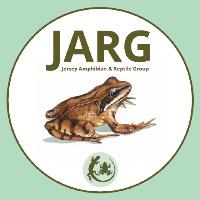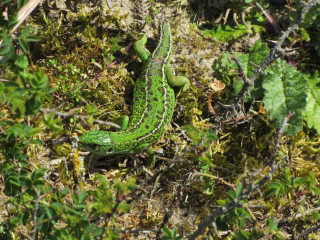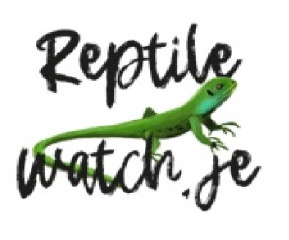About us
About Us
The Group, formerly known as The Agile Frog Group, originally formed in 1993, it was then was renamed to Jersey Amphibian & Reptile Group, JARG, in 2007. The aims of JARG are to:
- Raise awareness of our 3 Amphibian Species and 4 Reptile Species.
- Collect and collate herpetofauna records, sharing these with www.recordpool.org.uk & www.jerseybiodiversitycentre.org.je
- Encourage the general public to report their herpetofauna sightings.
- Conserve the native amphibians and reptiles through study and direct action.
- Provide general advice on our amphibian and reptile species as well as their habitat management.
The Amphibian and Reptile Species found on Jersey are:
Amphibians
- The Jersey Toad aka Crapaud (Bufo spinosus)
- Agile Frog (Rana dalmatina)
- Palmate Newt (Lissotriton helveticus)
Reptiles
- Grass Snake (Natrix helvetica)
- Slow Worm (Anguis fragilis)
- Green Lizard (Lacerta bilineata)
- Wall Lizard (Podarcis muralis)
All 3 Amphibians and 4 Reptiles are protected under the Wildlife (Jersey) Law 2021.
Amphibians and reptiles suffer from a poor public image – feared by some people and simply misunderstood by many others. It is important to encourage public appreciation and awareness of amphibians and reptiles by providing the opportunity for people to become involved in wildlife recording and conservation.
Many people have never seen a lizard or a snake and would not know where to see one; yet with simple guidance, the experience could be brought to many people, whilst overcoming the negative perceptions that often hamper conservation efforts.
News
News
Reptilewatch JE 2025 training event - 12 April 2025
Bookings are now open for the 2025 Reptilewatch JE monitoring scheme event and training day.
Reptilewatch JE Monitoring Scheme 2025
Come join us for the ReptilewatchJE 2025 training event at the Frances Le Sueur Centre! This in-person event is a fantastic opportunity to learn about reptiles and other wildlife you might encounter, help monitor their populations and contribute to their conservation. Whether you're a seasoned reptile enthusiast or just starting out, this event is perfect for anyone interested in nature and wildlife. Don't miss out on this exciting chance to make a difference and connect with nature!
What is Reptilewatch JE?
Reptilewatch is an island-wide effort to record Jersey’s four native reptile species. The project aims to assess how they are doing, where they are and what they need to survive and flourish in an environment. Getting involved in Reptilewatch is a fantastic way to regularly benefit from time surrounded by nature and to contribute to the protection of wildlife.
How can you help?
There are opportunities for everyone to get involved. Depending on your interest, available time and experience you can currently get involved in 3 different ways:
Single surveys – spend 30 minutes looking for reptiles and submit your results. No experience or training is required. Can be a one-off survey or you can do as many as you like at a variety of locations.
Wall lizard – carry out 6 surveys, each taking 30 minutes. You will search for wall lizards using visual searches. You do not need any experience, but you do need to attend this training event.
Widespread reptiles – carry out 6 surveys, each taking 1-2 hours. You will search for reptiles and other wildlife using visual searches and artificial refugia. You do not need any experience, but you do need to attend this training event.
Provisional Schedule
09:30 - Arrival, coffee and welcome
10:00 - Introduction
10:30 - Reptiles in Jersey and identification
11:00 - Break
11:30 - Survey methods (risk assessment and data recording)
13:00 -Lunch and sign up
13:45 - Reptilewatch App demonstration
14:15 - Field session
15:00 - Questions and site allocations
15:30 - Close
Light refreshments will be provided. We cannot cater for specific dietary requirements.
Please don’t forget to wear appropriate outdoor clothing and sturdy footwear to be able to participate in the field session. Please check weather forecast and bring water and sun protection if required.
Find out more about our Wild about Jersey initiatives on Wild About Jersey
Pondwatch 2025 - Training event
The Pondwatch JE 2025 season got off to a great start with a well attended training session at the Frances le Sueur Centre, thanks to the National Park for the use of the centre and pond !
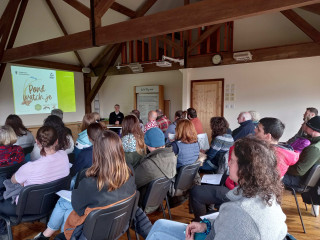
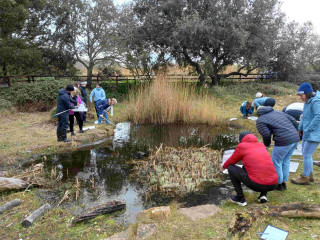
5 years of Pondwatch - training event

Our 5th annual Pondwatch training event was held at the Frances Le Sueur Centre on Saturday 28th January. It was hosted by the JARG group, and featured presentations from Dr John Wilkinson (ARC UK), Chris on freshwater eels, Adam on level 3 agile surveys and Sarah on recording your sightings, plus the outdoor practical training was filmed by ITV.
![]() 00._Intro_and_Pondwatch_JE_2023.pdf
00._Intro_and_Pondwatch_JE_2023.pdf
It's not too late to take part and contribute to the recording of Jersey's freshwater fauna. You can find copies of the presentations, species ID information and volunteer application forms on the Pondwatch section of the website.
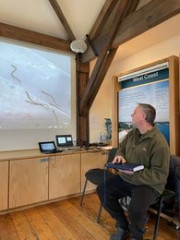
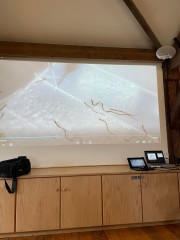
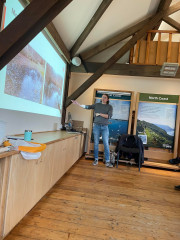
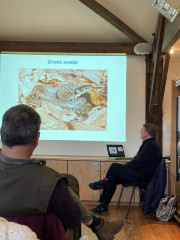
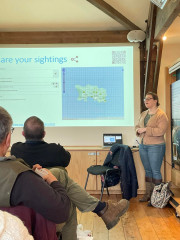
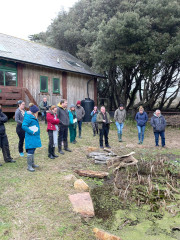
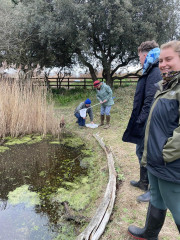
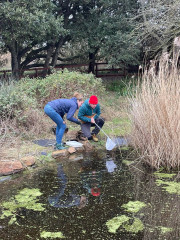
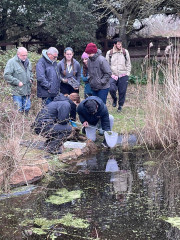
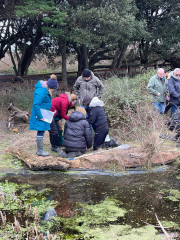
10 years of Toadwatch
The Department of the Environment commissioned the Amphibian and Reptile Trust to analyse and prepare a report on 10 years of citizen science data collected under the Toadwatch survey.
Jersey residents were asked to take part in Toadwatch by reporting sightings of toads using ponds. Data has now been collected over 10 years (2005 - 2014).
The analysis has created an up to date toad distribution map for Jersey. It has highlighted features of the Jersey landscape that are most important for toads and suggested areas to create new breeding ponds.
A breakdown of the types of ponds used for toad breeding overwhelmingly supports the suggestion that man-made habitats are critical for the species'' survival in the island. Ensuring these habitats are maintained and connected across the island is considered to be a critical task to conserve our toads into the future
Please find a link to this recently published report on the analysis of the data collected by Toadwatch volunteers since 2005.
http://www.gov.je/Government/Pages/StatesReports.aspx?ReportID=2442
Volunteer field assistants required – radio-tracking the grass snake in Jersey
Background
Currently we are carrying out a PhD on the “Status and conservation of grass snakes Natrix natrix and slow-worms Anguis fragilis in Jersey, C.I.” Records of grass snakes in Jersey are limited with a patchy distribution. Its status is unclear, with little information available on its ecology and population size in Jersey, there is much to be discovered. The grass snake is undoubtedly the rarest of Jersey’s reptiles. Determining the status of the species will provide insight into the need for intervention and species recovery. One of many research objectives are to investigate and model their movements, home range size, and habitat use therefore the ‘Think grass snake campaign’ needs your help.
The position
We require the support of keen volunteers to work alongside our PHD student to carry out this radio-tracking and monitoring. We are looking for people who are able to commit full regular days of independent radio tracking to up to 3 months starting ASAP. This could be 1 day a week or 5?
Volunteer activities will be focused around intensively tracking and, if necessary, searching for grass snakes and recording basic behavioral data in the field. Training will be given in radio-tracking, habitat assessment and understanding grass snake behavior. Volunteers will also be responsible for entering some of the data collected into the field database.
Requirements
Applicants will need to:
§ Have a background in biological sciences
§ Be happy to work outdoors and have some previous herpetology experience
§ Have flexibility, commitment and determination to work, under sometimes uncomfortable or frustrating conditions, combined with good physical fitness
§ Provide careful attention to data recording
§ Be able to commit minimum of 1 day per week for 3 months
§ Be resident in Jersey
§ Have transport within Jersey
This is the ideal opportunity for someone looking for practical conservation experience working with reptiles. If you wish to apply, please contact Rob ward rjw53@kent.ac.uk or telephone 07829968303
Events
Events
Past Events
Show Upcoming EventsOn-line course from University of Oxford
Fri 22nd March, 2013
The University of Oxford is running a course in Field Techniques for Surveying Fish and Amphibians due to commence on 22nd March 2013
The course is taught on-line across 5 weeks led by Dr Jon Shrives of the States of Jersey Environment Department with contributions from herpetologist Dr Steve Green from Operation Wallacea. Please visit our website below for full details:
www.conted.ox.ac.uk/amphibians
The course is designed with professionals and volunteers working in ecology and conservation in mind, offering a flexible approach to learning so students can study outside of office hours and from further afield in the UK or internationally.
Topics covered include survey planning and protocols, egg estimating and counting, and netting and trapping techniques.
Field Techniques for Surveying Fish and Amphibians is taught at postgraduate level and can be taken with or without academic accreditation which can be used towards future study, such as the University of Oxford Postgraduate Certificate in Ecological Survey Techniques.
To find out more about the Course Director Dr Jocelyne Hughes please use the link below:
http://www.conted.ox.ac.uk/staff/academicstaff/profile.php?a=sbj&id=85
If you have any questions please feel free to get in touch via est@conted.ox.ac.uk or 01865 286952
JARG Day 2015
Sat 14th February, 2015
How habitat loss threatens local wildlife is the focus of a seminar in Jersey later this month.
The Jersey Amphibian and Reptile Group (JARG) and the Department of the Environment jointly organise the day of talks, workshops and training on local amphibians and reptiles.
Each year the conference focuses on a different species or issues. This year, it’s how to protect the areas that reptiles and amphibians in Jersey need to thrive. Talks include one by National Trust for Jersey Countryside Ranger Sally Dalman called: ‘Relocation, relocation, relocation – how I become a lizard stalker for the summer’.
Many scientists consider loss of suitable habitat to be the largest single factor contributing to the drop in amphibian numbers. This can be caused by development, pollution incidents, invasive plants and animals, and more extreme weather.
States of Jersey Research Ecologist Nina Cornish said, “Habitat conservation for wild species is one of the most important tools for protecting and enhancing our natural environment. As land use increases, our frogs, toads, snakes and lizards have less space to call home which has an impact on numbers.”
She added, “However, we’ve seen how initiatives like the agile frog species recovery programme can make a real difference. Habitat management of the ponds at Ouaisné and Noirmont, where we’ve removed gorse, scrub and willow, has helped significantly. In 1997, there were just six frog spawn clumps in the ponds. Last year we counted 50 – proof that effective habitat conservation can contribute to saving a species on the brink of extinction.”
In the afternoon, the focus will be on Jersey’s National Amphibian and Reptile Recording Scheme (www.narrs.org.uk), a partnership project which has been running in Jersey six years, led by the UK’s Amphibian and Reptile Conservation Group.
The event is open to anyone interested in learning more about amphibians and reptiles and who want to get involved in wildlife recording and conservation.
The seminar and training day is being held at the Frances Le Sueur Centre, St Ouen, on Saturday 14 February 9.30am to 3.30 pm.
If you would like to attend, please reserve a place by contacting Julia Meldrum on 441665 or by email j.meldrum@gov.je
Wild About Jersey
Sat 11th February, 2017 - Sun 12th February, 2017
Wild About Jersey
Interested in Jersey’s wildlife and how you can make a difference?
Wild About Jersey takes place at Acorn Enterprises, Trinity on 11th and 12th February 2017 and is organised by the Department of the Environment’s Natural Environment team. It aims to bring people and organisations together to learn about protecting and conserving Jersey’s plant and animal life.
PondwatchJE 2022 Training event
Sat 12th February, 2022
Get involved, help gather sightings of Jersey’s pond life and become a trained Wild Volunteer to help us assess and conserve their habitat
About this event
What is Pondwatch JE?
Pondwatch JE is a project that aims to gather sightings of Jersey’s pond life to help assess their conservation status, distribution and habitat requirements.
How can you help?
There are opportunities for everyone to get involved. Depending on your interest, available time and experience you can currently get involved in two ways.
- Level 1 – spend 30 minutes looking for wildlife in ponds and send us your results. No experience or training is required.
- Level 2 – carry out 5 surveys, each taking 30‒60 minutes. You will search for amphibians and other pond life at a pond using three methods; visual searches, netting and night time torch surveys. You do not need experience but you will need to attend a training event.
Schedule of the day (provisional):
10:00 Arrival (tea/coffee)
10:15 What is Pondwatch and how can you get involved?
10:30 Pond Life identification
11:15 Level 1 – Pondwatch
- • Pond survey methods and data recording
11:45 Level 2 - Pondwatch
- • Pond survey methods including habitat assessment, health & safety and biosecurity
- • Data recording
12:45 Level 2 -Pondwatch Field Session
- • Demonstration, practical session and questions
13:30 Lunch and sign up
Lunch break with opportunity to sign up and discuss sites and pond allocations.
Note: Light refreshments will be provided. We cannot cater for specific dietary requirements.
Find out more about our initiatives on gov.je.
Please don't forget to wear appropriate clothing and bring some wellington boots and waterproofs to be able to participate in the field session.
Pondwatch JE is the successor to both the National Amphibian and Reptile Recording Scheme (NARRS) which ran in Jersey from 2007 to 2018 and Toadwatch which ran from 2005 to 2018. During this time volunteers provided a great deal of information which has been used to inform the design of Pondwatch as well as influence efforts to protect the species.
Reptilewatch JE - 2022 training event
Sat 23rd April, 2022
What is Reptilewatch JE?
Reptilewatch is the successor to the National Amphibian and Reptile Recording Scheme (NARRS) which ran in Jersey from 2007 to 2018. During this time volunteers provided a great deal of information which has been used to inform the design of Reptilewatch as well as influence efforts to protect the species.
Reptilewatch JE is a project that aims to gather sightings of Jersey’s reptiles to help assess their conservation status, distribution and habitat requirements.
By taking part in the Reptilewatch scheme, you will be contributing important data to inform the ongoing conservation of these incredible creatures and helping inform future policies.
How can you help?
There are opportunities for everyone to get involved. Depending on your interest, available time and experience you can currently get involved in two ways.
- Level 1 – spend 30 minutes looking for reptiles
No experience or training is required.
- Level 2 Wall lizard - carry out 6 visual surveys, each taking 30 minutes
No previous experience needed but attendance at this training session is required.
Schedule of the day (provisional):
- Welcome and Introduction
- Identification of Reptiles and some of the other animals you might encounter
- How to get involved Level 1
- How to get involved Level 2 -Wall Lizard
- Field Session
- Opportunity to sign up and network with other volunteers
Light refreshments will be provided.
Find out more about our initiatives on gov.je.
Please don't forget to wear appropriate clothing and footwear for the field session.
If we are lucky enough to have good weather on the day, please bring a hat and appropriate sun protection and some drinking water. Also, if you have any close focusing binoculars, please bring these with you.
Pondwatch 2023 training
Sat 28th January, 2023

JARG is pleased to announce our Pondwatch training day on 28th January at the Frances Le Sueur Centre
Get involved, help gather sightings of Jersey’s pond life and become a trained Wild Volunteer to help us assess and conserve their habitat
What is Pondwatch JE?
Pondwatch JE is a project that aims to gather sightings of Jersey’s pond life to help assess their conservation status, distribution and habitat requirements.
How can you help?
There are opportunities for everyone to get involved. Depending on your interest, available time and experience you can currently get involved in two ways.
- Level 1 – spend 30 minutes looking for wildlife in ponds and send us your results. No experience or training is required.
- Level 2 – carry out 5 surveys, each taking 30‒60 minutes. You will search for amphibians and other pond life at a pond using three methods; visual searches, netting and night time torch surveys. You do not need experience but you will need to attend a training event.
Schedule of the day:
- • 10:00 - Bob Thompkins - Local Naturalist - Jersey Eels
- • 10:20 - Adam Dallas Chapman - Government of Jersey - Nocturnal Adventures - The Agile frog
- • 10:45 - John Wilkinson – Amphibian and Reptile Conservation - Pond Life identification
- • 11:15 – Sarah Maguire – Jersey Biodiversity Centre - Level 1 – Pondwatch - Pond survey methods and data recording
- • 11:45 - John Wilkinson – Amphibian and Reptile Conservation - Level 2 – Pondwatch - Pond survey methods including habitat assessment, health & safety, biosecurity and data recording
- • 12:30 - Demonstration, practical session and questions led by JARG and ARC - Level 2 -Pondwatch Field Session
13:30 - Lunch
14:00 - Sign up
After lunch there will be an opportunity sign up, discuss ponds sites, allocate ponds if needed.Once signed up you can take equipment and sign the relevant forms.
Note: Light refreshments will be provided. We cannot cater for specific dietary requirements.
Please don't forget to wear appropriate clothing and bring some wellington boots and waterproofs to be able to participate in the field session.
Pondwatch is the successor to both the National Amphibian and Reptile Recording Scheme (NARRS) which ran in Jersey from 2007 to 2018 and Toadwatch which ran from 2005 to 2018. During this time volunteers provided a great deal of information which has been used to inform the design of Pondwatch as well as influence efforts to protect the species. 2023 is Pondwatch’s 5th Anniversary.
Reptilewatch JE 2023
Sat 18th March, 2023
Search for reptiles and share your sightings to help reptile conservation
Jersey has four native reptile species, some of which are rarely seen and are limited to certain habitats.
Want to get more involved?
This year marks the 5th year of the scheme and we would like to encourage more people to get involved.
There are opportunities for everyone. Depending on your interest, available time and experience you can currently get involved in the following ways:
-
Level 1 - spend 30 minutes looking for reptiles and send us your results. Add your sightings now here
-
Level 2 Wall lizard - carry out 6 visual surveys, each taking 30 minutes No previous experience needed but attendance at this training session is required.
-
Level 2 Widespread - carry out 6 visual surveys along a transect, each taking 1-2hours. No previous experience needed but attendance at this training session is required.
For more information about the training day and to book your free place - please goto Eventbrite
Pondwatch 2024
Sat 17th February, 2024
The annual Pondwatch JE training event takes place this coming Saturday.
If you would like to come along please reserve your place via Eventbrite. There are only a few places still available so book now to avoid missing out.
Date and Time: Saturday, 17th February 2024, 10am - 4pm.
Location: Frances Le Sueur Centre, St Ouen.
What is Pondwatch JE?
Pondwatch JE is a project that aims to gather sightings of Jersey’s pond life to help assess their conservation status, distribution and habitat requirements.
How can you help?
There are opportunities for everyone to get involved. Depending on your interest, available time and experience you can currently get involved in two ways.
Level 1
Spend 30 minutes looking for wildlife in ponds and send us your results here. No experience or training is required but we recommend that you attend the annual training event (details below) to find out more about the survey and the incredible diversity of wildlife that ponds support.
Level 2
Carry out 5 surveys, each taking 30‒60 minutes. You will search for amphibians and other pond life at a pond using three methods; visual searches, netting and night time torch surveys. You do not need experience but you will need to attend a training event.
Training
An in-person training event is held at the start of the Pondwatch survey season each year.
The 2024 training event will take place on Saturday 17th February 2024 from 10am - 4pm at the Frances Le Sueur Centre, St Ouen.
This free event is open everyone although we ask that anyone wishing to attend reserves a place via Eventbrite
Schedule of the day:
9:45 – Arrival /Coffee
10:00 – Welcome and Introduction to Pondwatch JE
10:10 - Jon Rault – Jersey Biodiversity Centre- Newts in Jersey
10:25 – Tina Hull – How to spot pesky plants (invasive non-native plants in ponds and how to avoid spreading them further)
10:40 - John Wilkinson – Amphibian and Reptile Conservation - Pond Life identification
11:00 – Jon Rault – Jersey Biodiversity Centre - Level 1 – Pondwatch - Pond survey methods and data recording
Comfort break
11:20 - Jon Rault Jersey Biodiversity Centre - Level 1 – Pondwatch - Pond survey methods and data recording
11:45 - John Wilkinson – Amphibian and Reptile Conservation - Level 2 – Pondwatch - Pond survey methods including habitat assessment, health & safety, biosecurity
11:25 – Liz Walsh - Level 2 online data recording
12:30 - John Wilkinson – Level 2 -Pondwatch Field Session -Demonstration, practical session and questions
13:30 – Lunch & Sign up
During the lunch break there will be an opportunity sign up, discuss ponds sites and allocate ponds if needed. Once signed up you can take equipment and sign the relevant forms.
Note: Light refreshments will be provided. Unfortunately we are unable to cater for specific dietary requirements.
Please don't forget to wear appropriate clothing and bring some wellington boots and waterproofs to be able to participate in the field session.
What if I don't have a pond of my own?
If you don't have a pond of your own to survey the PondwatchJE team can allocate you one. Please speak to one of the team at the training event or alternatively contact wildaboutjersey@gov.je.
2025 Pondwatch Training event
Sat 15th February, 2025
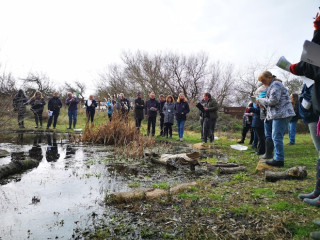
Pondwatch JE - Training Event 2025
Saturday 15th February 10am-2pm at
Get involved, help gather sightings of Jersey’s pond life and become a trained Wild Volunteer to help us assess and conserve their habitat.
What is Pondwatch JE?
Pondwatch JE is a project that aims to gather sightings of Jersey’s pond life to help assess their conservation status, distribution and habitat requirements.
How can you help?
There are opportunities for everyone to get involved. Depending on your interest, available time and experience you can currently get involved in two ways.
- Level 1 – spend 30 minutes looking for wildlife in ponds and send us your results. No experience or training is required.
- Level 2- carry out 5 surveys, each taking 30-60 minutes. You will search for amphibians and other pond life using three different methods: visual searches, netting and night-time torch surveys.
You do not need experience but you will need to attend the training event
Schedule of the day:
0945 Arrival/coffee
1000 Welcome and introduction to Pondwatch (Tim Wright)
1015 A brief review of what we have learnt from the last six years of Pondwatch (Tim Wright)
1030 Pondlife identification – amphibians, reptiles and fish (John Wilkinson)
1100 Pondlife identification – dragonflies and other invertebrates (John Wilkinson)
1120 Short break
1130 Carrying out Pondwatch Level 1 (pond survey methods and data recording (Emily Wagdin)
1155 Carrying out Pondwatch Level 2 (pond survey methods including habitat assessment, safety and biosecurity) (John Wilkinson)
1230 Data entry for Pondwatch Level 2 (Emily Wagdin)
1240 Practical field session – demonstration, practical session and Q&A
1330 Lunch and opportunity to sign up as a volunteer
During the lunch break there will be an to opportunity sign up, discuss pond sites, and allocate ponds if needed. Once signed up you can take equipment and sign the relevant forms.
The sessions are free and open to anyone. Light refreshments will be available, but please note we may not be able to cater for all allergies and dietary requirements.
How to book your place
Anyone who wants to attend the event can reserve a place on line via Eventbrite: Book your free ticket here or email wildaboutjersey@gov.je
Pondwatch is the successor to both the National Amphibian and Reptile Recording Scheme (NARRS) which ran in Jersey from 2007 to 2018 and Toadwatch which ran from 2005 to 2018. During this time volunteers provided a great deal of information which has been used to inform the design of Pondwatch as well as influence efforts to protect the species.
|
|
|
|
Reptilewatch JE 2025 training event
Sat 12th April, 2025
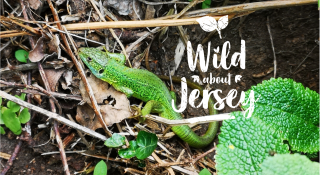
Reptilewatch JE Monitoring Scheme 2025
Come join us for the ReptilewatchJE 2025 training event at the Frances Le Sueur Centre! This in-person event is a fantastic opportunity to learn about reptiles and other wildlife you might encounter, help monitor their populations and contribute to their conservation. Whether you're a seasoned reptile enthusiast or just starting out, this event is perfect for anyone interested in nature and wildlife. Don't miss out on this exciting chance to make a difference and connect with nature!
What is Reptilewatch JE?
Reptilewatch is an island-wide effort to record Jersey’s four native reptile species. The project aims to assess how they are doing, where they are and what they need to survive and flourish in an environment. Getting involved in Reptilewatch is a fantastic way to regularly benefit from time surrounded by nature and to contribute to the protection of wildlife.
How can you help?
There are opportunities for everyone to get involved. Depending on your interest, available time and experience you can currently get involved in 3 different ways:
Single surveys – spend 30 minutes looking for reptiles and submit your results. No experience or training is required. Can be a one-off survey or you can do as many as you like at a variety of locations.
Wall lizard – carry out 6 surveys, each taking 30 minutes. You will search for wall lizards using visual searches. You do not need any experience, but you do need to attend this training event.
Widespread reptiles – carry out 6 surveys, each taking 1-2 hours. You will search for reptiles and other wildlife using visual searches and artificial refugia. You do not need any experience, but you do need to attend this training event.
Provisional Schedule
09:30 - Arrival, coffee and welcome
10:00 - Introduction
10:30 - Reptiles in Jersey and identification
11:00 - Break
11:30 - Survey methods (risk assessment and data recording)
13:00 -Lunch and sign up
13:45 - Reptilewatch App demonstration
14:15 - Field session
15:00 - Questions and site allocations
15:30 - Close
Light refreshments will be provided. We cannot cater for specific dietary requirements.
Please don’t forget to wear appropriate outdoor clothing and sturdy footwear to be able to participate in the field session. Please check weather forecast and bring water and sun protection if required.
Find out more about our Wild about Jersey initiatives on Wild About Jersey
Factsheets
Factsheets
Amphibian factsheets
Reptile factsheets
Pondwatch JE
Pondwatch JE
What is Pondwatch JE?
Jersey has three native amphibian species, and a host of other wildlife for which ponds are a vital habitat.
Pondwatch JE was launched in 2018 with the aim of using citizen science to help gather sightings of Jersey’s pond life, so we can help assess their conservation status, distribution and habitat requirements. Pondwatch JE is the successor to both the National Amphibian and Reptile Recording Scheme (NARRS) which ran in Jersey from 2007 to 2018 and Toadwatch which ran from 2005 to 2018. During this time volunteers provided a great deal of information which has been used to inform the design of Pondwatch JE as well as influence efforts to protect the species.
Pondwatch JE was launched at the 2019 Wild about Jersey event.
How can you help?
There are opportunities for everyone to get involved, with 3 levels of surveys depending on your interest, available time and experience.
All surveys take place between January and May.
Check out the training presentations below for an overview of the scheme and to learn more about the pond life you may encounter.
Training: Introduction to Pondwatch JE
Training: Pond Life Identification
Training: Dragonflies and inverts
Training: Invasive plant identification
Level 1 – spend 30 minutes looking for wildlife in ponds and send us your results. No experience or training is required.
![]() Pondwatch JE level 1 survey form
Pondwatch JE level 1 survey form
Level 2 – carry out 5 surveys, each taking 30 to 60 minutes. You will search for amphibians and other pondlife at a pond using three methods; visual searches, netting and night time torch surveys. You do not need experience but you will need to attend a training event.
Training: Pondwatch JE Level 2
Training: Pondwatch JE L2 - Recording your data
![]() Pondwatch JE level 2 survey form
Pondwatch JE level 2 survey form
![]() Grassland classifications guide is a summary of the key grassland habitats you may find in your survey area.
Grassland classifications guide is a summary of the key grassland habitats you may find in your survey area.
This guide is adapted from the UK Habitat Classification (UK Habitat Classification Working Group, 2018)
Level 3 – you will carry out multiple intensive surveys at known and suspected agile frog sites. You will also contribute to testing Jersey’s amphibians for diseases. This is for experienced surveyors only.
All Pondwatch JE surveys take place between January and May.
Water quality tests – you can help us assess the level of pollution in Jersey’s ponds using quick and simple test kits.
![]() Pondwatch JE Water quality handbook
Pondwatch JE Water quality handbook
![]() Pondwatch JE Water quality form
Pondwatch JE Water quality form
Even if you don't have the time to commit to one of these surveys, you can still join in by recording any sighting you have and submit these as a casual record.
Getting started
Before starting your survey you will need to complete a volunteer working agreement and have written consent from the landowner.
Following the instructions in the appropriate level handbook, visit the site and modify the generic risk assessment as required for any risks associated with the site.
![]() Generic Risk Assessment Template (ARG UK)
Generic Risk Assessment Template (ARG UK)
ID guides
A number of identification guides and information sources are available for you to download:
A guide to the identification of Jersey amphibians - ![]() Amphibians of Jersey ID guide
Amphibians of Jersey ID guide
A guide to the identification of Dragonfly and Damselfly - ![]() Dragonfly and damselfly ID guide
Dragonfly and damselfly ID guide
A summary of invasive non-native plants and a free e-learning course are available via the links below.
Invasive Non-Native aquatic plant species ID guides
Invasive Non-Native Species free e-learning course
For help with habitat classifications the UK Habitat Classification guidance is available from the ecountability.co.uk website.
Additional resources
![]() Pondwatch JE training presentation
Pondwatch JE training presentation
Reptilewatch JE
Reptilewatch JE
What is Reptilewatch JE?
Jersey has four native reptile species, some of which are rarely seen and are limited to certain habitats. Reptilewatch JE is a new project that aims to gather sightings of Jersey’s four native reptile species to help assess their conservation status, distribution and habitat requirements. Reptilewatch JE is the successor to the widespread reptile surveys undertaken as part of the National Amphibian and Reptile Recording Scheme (NARRS) which ran in Jersey from 2007 to 2018. During this time volunteers provided a great deal of information which has been used to inform the design of Reptilewatch JE as well as influence efforts to protect the species.
Reptilewatch JE was launched at the 2019 Wild about Jersey event, you can review the presentation here:![]() Reptilewatch JE training presentation.
Reptilewatch JE training presentation.
How can you help?
There are opportunities for everyone to get involved, with 3 levels of surveys depending on your interest, available time and experience.
All surveys take place between March and October.
Check out the training presentation below for an overview of the scheme and to learn more about the reptiles and other wildlife you may encounter.
Reptilewatch Introduction and Identifying Jersey reptiles
![]() 1.Reptilewatch -ID other species.pdf
1.Reptilewatch -ID other species.pdf
Level 1 – spend 30 minutes looking for reptiles and send us your results. No experience or training is required.
Reptilewatch JE Training: Level 1
![]() Reptilewatch JE Level 1 survey form
Reptilewatch JE Level 1 survey form
![]() Reptilewatch JE Level 1 handbook
Reptilewatch JE Level 1 handbook
Level 2, option 1 – carry out 6 surveys, each taking 1 to 2 hours. You will search for reptiles along a survey route and check artificial refugia (sheets of roofing material) for reptiles and other species. You will need training at one of our training events but no previous experience is needed.
Reptilewatch JE Training: Level 2
![]() Reptilewatch JE Level 2 widespread reptiles handbook
Reptilewatch JE Level 2 widespread reptiles handbook
Level 2, option 2 – carry out 6 surveys, each taking 30 minutes. You will search for wall lizards at known and suspected wall lizard sites. You will need training at one of our training events but no previous experience is needed.
Reptilewatch JE Training: Level 2 Wall Lizard
![]() Reptilewatch Level 2 wall lizard handbook
Reptilewatch Level 2 wall lizard handbook
![]() Reptilewatch Level 2 Wall Lizard survey form
Reptilewatch Level 2 Wall Lizard survey form
Level 3 – you will carry out multiple intensive surveys at known and suspected grass snake sites. This is for experienced surveyors only.
All surveys take place between March and October.
If you currently do not have time to commit to carrying out these surveys please record any sighting you have and add a casual record.
Getting started
Before starting your survey you will need to complete a volunteer working agreement and have written consent from the landowner.
Please complete and return the volunteer and landowner agreement forms to the Natural Environment Team before you get started.
The next step is to consider the risks associated with your survey and the surrounding area.
Please refer to the ![]() Generic risk assessment template and modify this as required.
Generic risk assessment template and modify this as required.
How to survey
A reminder of the 2020 training presentation is provided here:
For survey guidance, please refer to the relevant handbook for the level of survey you are undertaking.
Additional help on habitat assessment of grassland areas is available from the UK Habitat Classification website: ecountability.co.uk
Reptilewatch JE ID Guides
A series of ID guides are provided to help with identifying the reptiles and other species you might find on your surveys.
![]() Cockroaches of Jersey ID guide
Cockroaches of Jersey ID guide
For help with habitat classifications the UK Habitat Classification guidance is available from the ecountability.co.uk website.
Photo gallery
Photo Gallery
Upcoming Events
Upcoming events will be listed here.
Latest News
- Reptilewatch JE 2025 training event - 12 April 2025
17/03/2025 3:00 pm - Pondwatch 2025 - Training event
18/02/2025 11:04 am - 5 years of Pondwatch - training event
26/02/2023 5:28 pm - 10 years of Toadwatch
18/11/2016 1:44 pm - Volunteer field assistants required – radio-tracking the grass snake in Jersey
23/06/2015 11:38 am
© Jersey Amphibian and Reptile Group (JARG)
Website hits: 46947
View All | Find out how to get a mini-website for your ARG
© ARG UK Local Groups mini-websites 2026
Wind powered websites by Aye-aye Design.
